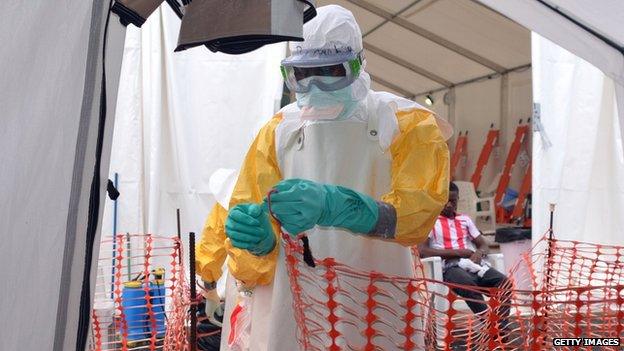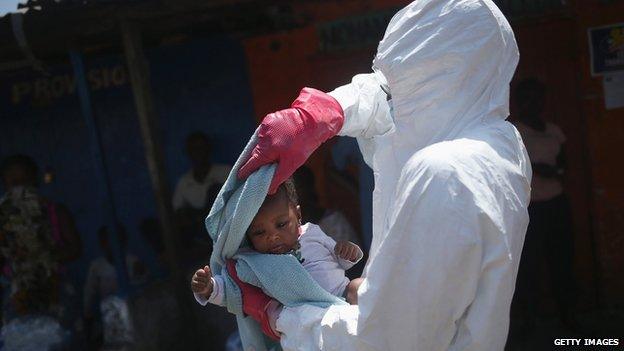Ebola: Are cases levelling off?
- Published

We may be entering a new phase of the Ebola epidemic in West Africa.
There is growing - but certainly guarded - talk within the World Health Organization that the overall number of new cases is levelling off.
Officials have told me they now expect the figure to stick at around 1,000 fresh cases each week.
It is in sharp contrast to the early phase of the outbreak when the number was doubling every three to four weeks.
Back in September, a major report, external by a team at the WHO and Imperial College London was estimating 20,000 cases by today (November 2).
Instead the number of confirmed, probable and suspected cases stands at 13,567, external.
Those early predictions, based on mathematical modelling, were hugely important for making the world pay attention to the severity of the outbreak.
They were based on the "exponential growth phase" of the epidemic, in which the rate of new infections soar.
But now that exponential phase may be over.

Levelling off?
Dr Christopher Dye, the director of strategy in the office of the director general at the World Health Organization, has the challenge of predicting the spread of Ebola.
"Things clearly have changed with respect to the trajectory of the epidemic," he told the BBC News website.
"What we've seen is, very clearly, a slowing down in the some of the affected areas in the three countries."
Lofa county in Liberia as well as Kenema and Kailahun district in Sierra Leone are held up as areas making strong progress.
Dr Dye added: "When we look at the total epidemic now, with the best information we have got available I would guardedly say that the case incidence per week is not going to get larger than it is at the moment, so around 1,000 cases per week.
"In terms of the trend of the epidemic, it is possible it has flattened out.
"We know there's under-reporting so we have to emphasise caution, but broadly we're out of this big epidemic growth phase seen in August and September."
Ebola deaths
Figures up to 13 January 2016
11,315
Deaths - probable, confirmed and suspected
(Includes one in the US and six in Mali)
-
4,809 Liberia
-
3,955 Sierra Leone
-
2,536 Guinea
-
8 Nigeria
Tiger waiting to pounce
Even if it is confirmed, 1,000 cases per week is still no cause for celebration.
That would be the equivalent of every other Ebola outbreak in history happening every fortnight.
And any attempt to claim Ebola is being contained is "like saying your pet tiger is under control", as the WHO's Dr Bruce Aylward put it last week.
There is still clearly a huge amount of work ahead.
However, Dr Nick Golding from the University of Oxford shares the broad view that the dynamics of the outbreak are shifting.
He said: "That's probably right when you look at the whole outbreak, but in specific areas it's still growing exponentially.
"It certainly looks like that for Liberia and the capital Monrovia; it appears to have plateaued in the past two months of data and there's a similar sort of thing in Guinea, but I'm not sure we can say that for Sierra Leone."
Bad stats
However, the data remains extremely poor.
This is particularly pertinent in Liberia - where new cases are supposedly falling - as only 38% of the reported cases are actually laboratory confirmed, compared with 85% in Guinea.
There is also the overhanging spectre of vast numbers of unreported cases - the best guess is there are around twice as many cases out there as have been reported.
New predictions on the future of the outbreak are expected soon as scientists get to grips with the changing shape of the epidemic.
It seems certain that the early prediction by the US Centres of Disease Control of 1.4 million cases by January, external is way too high.
But Dr Dye concluded: "Even if we are able to say the exponential phase is over, our goal is complete elimination in the human population and we clearly have a long way to go on that.
"If we could show cases falling in every area - and we can't - we would still have a major job on our hands."